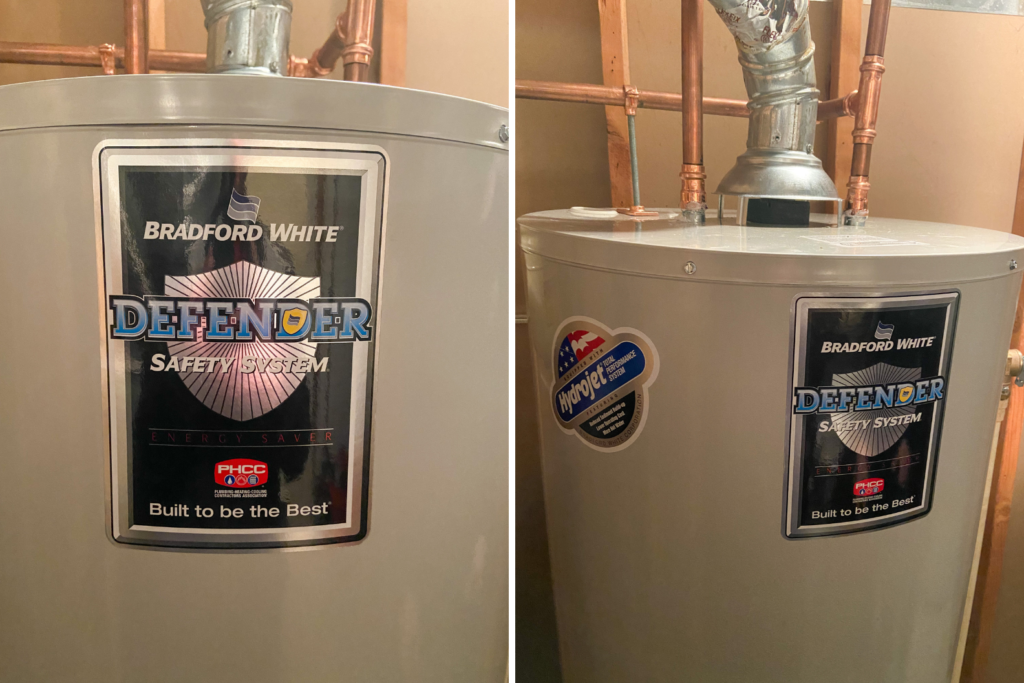We’ve said it numerous times before, but the water heater is undoubtedly an important part of one’s plumbing system. After all, if you’ve ever hopped in the shower and not had hot water, I’m sure it wasn’t the best of experiences! Knowing the important role it plays in our day-to-day lives, it’s no surprise why it is a frequent topic of discussion on our plumbing blog. Whether that be maintaining your existing water heater, having a better understanding of the various components that help the heater operate in a safe and efficient manner, or a number of other water heater-related topics, there’s plenty to talk about!
When it comes to the different plumbing pieces or fixtures, I think most homeowners would agree that a major goal for one’s plumbing system is to receive as good of a return on their investment as possible. In other words, when you have something like a water heater installed, you want to not only have the unit function properly, but also make sure you get the expected number of years out of the heater. Well…in order for this to happen, the first step is going to involve purchasing the correct water heater. There are a few different variables that factor into this purchasing decision, including selecting a water heater made by a reputable brand. In addition to this, you’re also going to need a water heater properly sized for your home. As you can likely guess, if your water heater isn’t big enough for your regular water heating needs, issues are going to inevitably arise!
Sizing a Storage Tank Water Heater
We’ll start off with the traditional storage tank water heaters, which continue to be a popular choice for many homeowners. On average, storage tank water heaters typically last roughly 12-15 years. Since these types of water heaters have a set capacity, it’s important to get one properly sized for your home’s needs. With that being said, one measurement technique that you could take into account would be the number of people in your household. If you have more people living in your house, then you would likely be using more water, right? So…with that being said, what would be some general guidelines to follow? While there are smaller water heater tanks, the sizes that you’ll see most often in residential homes are 40, 50 and 80-gallons. For households of 3 or less, a 40-gallon will likely be sufficient. 4-5 person households might want to consider a 50-gallon, while households larger than that would possibly go with an 80-gallon or (2) 40-gallon tanks.
Another variable that you can take into account would be the water heater’s first-hour rating. Unsurprisingly, this represents the amount of hot water that the heater can supply in its first hour of usage. To calculate this, you would need to take the size of the tank (40-gallons, for example) multiplied by 0.70 and then add on the recovery rate. Once you have these numbers, you can evaluate how much hot water you might need at one particular time and determine whether a particular water heater size is sufficient.
To sum it up, when it comes to sizing a storage tank water heater, these two variables listed above would be the perfect starting point!
Sizing a Tankless Water Heater
While storage tank water heaters are likely still the most popular type of water heater, they aren’t the only option out there for homeowners! A potential alternative would be the increasingly-popular tankless water heaters. Although they do come at a higher initial cost, there’s no denying that tankless water heaters offer a number of unique advantages, including occupying much less space than their storage tank counterparts. Not to mention, you’ll also find that tankless units are often referred to as on-demand water heaters. What this means is they’re only heating the water when it is actually needed and as such, they’re generally much more efficient too. Now, on to the primary topic of this week’s blog post, which is how you can ensure your tankless water heater is properly sized for your home’s water heating needs. After all, just as we mentioned in the previous section, that is going to be an extremely important first step! Once you have the right size, you’ll just need to ensure you purchase a heater made by a reputable brand.
In regards to sizing your home’s tankless water heater, one factor that you’ll take into account is something referred to as flow rate. The unit of measurement for the flow rate is GPM, or gallons per minute. When you’re looking at potential tankless water heaters to purchase, you’ll notice that the flow rate of the particular unit will be listed. In order to determine if a particular flow rate is sufficient for your household’s water heating needs, you’ll want to evaluate the most water you may be using at one time. Think of the different appliances or fixtures that you would likely be using at one time and add up the standard flow rates for each of these individual pieces. That will help you decide which size of tankless water heater is needed!
A second factor that you’ll consider is the temperature rise. This is another variable that’s easy to calculate, as it is simply figured by subtracting the incoming water temperature from the temperature that you want the water heated to. As simple as that! Having this piece of information will help immensely in selecting the right-size of tankless water heater for your home.
All in all, it’s no surprise why tankless water heaters continue to be a popular option for homeowners. They offer quite a few unique features, including the ability to have limitless hot water (assuming it’s sized correctly) and even save you money on utilities in the long run from their increased efficiency levels. Our team at Stine-Nichols Plumbing installs both storage tank and tankless water heaters. If you’re unsure which would be the best fit for your home, we would be happy to put together estimates for the two and provide you with more information on the advantages associated with each.
Water Heater Installation and Repair Services in Kansas City
Is your existing water heater starting to show some signs of diminished performance? If this is the case and it is near (or above) the expected lifespan for that type of water heater, it may be time to consider whether or not a replacement would be the best next step. Throughout this week’s blog post, we discussed why it is so important to purchase a properly-sized water heater in the first place. However, you have to remember that water heaters aren’t built to last forever and will eventually need to be replaced! Nonetheless, if you purchase a quality water heater, have an experienced plumbing professional install it and follow that up with the correct maintenance, you’ll be in great shape!
Our team at Stine-Nichols Plumbing has plenty of experience working with water heaters. From installing new units, performing regular maintenance on existing water heaters or even troubleshooting issues, water heaters are a prime example of something we work with on a consistent basis. For those that live in or near the Kansas City area, we would be happy to help you with any of your water heater needs! To learn more about our services and to speak with a member of our team, feel free to give us a call at (816) 348-3481.


